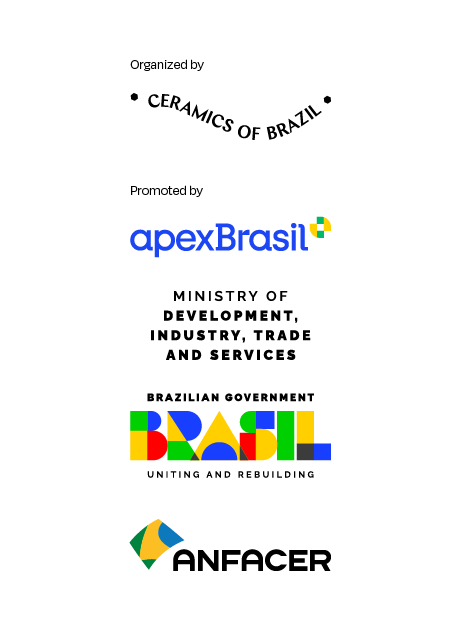%2017.23.20_a5750671.jpg)
The Brazilian ceramics sector is one of the country's largest consumers of natural gas. An essential energy input for the production process, natural gas currently accounts for around 30% of the total cost of producing a square meter of ceramics, which makes it a determining factor in the sector's competitiveness.
Given this context, at the event held on June 16 at Fiesp, the national ceramics sector reinforced its support for the measures proposed by the Minister of Mines and Energy, Alexandre Silveira, who has been actively promoting initiatives to increase the supply and reduce the cost of gas for the national industry. Silveira once again defended cheaper gas as a condition for re-industrializing Brazil.
The Gas for Employment seminar aimed to discuss ways of achieving a fairer and more sustainable price structure for natural gas, bringing together important names in the sector and organizations such as ASPACER, ANFACER, ABRACE, ABIVIDRO, Petrobras and the Ministry of Mines and Energy, with 400 people taking part.
The program was opened by the president of Fiesp, Josué Gomes da Silva, who stressed that the high cost of natural gas has hampered Brazilian industry's ability to compete in the global market. This disadvantage becomes clear when comparing the price of gas in Brazil with that of other competing countries, which can be up to five times higher.
Representing the ceramics sector were Anfacer's executive president, Maurício Borges, and Aspacer's director of Institutional Relations, Luís Fernando Quilici, who made up the panel discussion. Quilici pointed out that the high cost of natural gas continues to be one of the main obstacles to the development of the ceramics industry in Brazil. According to him, despite the progress made in accessing the free market - especially in the state of São Paulo, where around 95% of the sector's consumption has already migrated to this model - the challenges related to the price of the molecule, the flow infrastructure, processing and transportation and distribution tariffs still limit the sector's competitiveness. Ceramic industries in the states of Santa Catarina, Espírito Santo and Sergipe have already migrated to the free gas market. In Paraná, the ceramics industry is also expected to migrate at the beginning of the second semester. "Natural gas needs to be understood as a state policy if Brazil's neo-industrialization is to come to fruition. The ceramics industry has already shown its willingness to move forward, but it is essential to guarantee fair and predictable supply conditions. Without competitiveness in the input, there is no sustainable development for the industry," he said.
Access the full panel here:
Check out the participants in each panel:
Supply of domestic and imported gas: Heloísa Borges, Director of Oil, Gas and Biofuels Studies at the Energy Research Company (EPE); Luis Fernando Paroli, President of PPSA; Alvaro Tupiassu, Executive Manager of Gas and Energy at Petrobrás; Marcello Weydt, Director of the Natural Gas Department at the MME; Décio Oddone, CEO of Brava Energia; Eloi Fernández - Director of the Energy Institute at PUC-Rio - IEPUC and Ana Carolina Neves - Head of Natural Gas Marketing at Equinor.
Regulation and market dynamics: Luís Fernando Quilici, director of Institutional Relations at Aspacer; Pietro Mendes, secretary of Petroleum, Natural Gas and Biofuels at the MME; Lucien Belmonte, executive president of Abividro; Adriano Lorenzon, director of Natural Gas at Abrace; Bruno Armbrust, founding partner of ARM Consultoria. The event ended with a panel by global energy expert Ieda Gomes.
Meeting at the MME
This is the sector's second meeting with the MME in June. On June 11, Minister Alexandre Silveira received leaders of energy-intensive industrial sectors from various regions of Brazil, including representatives of the ceramics industry, including the president of Anfacer's Board of Directors, Sergio Wuaden; the president of Aspacer's Board of Directors, Eduardo Roncoroni Fior; the vice-president of Anfacer and Aspacer, Benjamin Ferreira Neto and Aspacer's director of Institutional Relations and Anfacer consultant, Luís Fernando Quilici.
The meeting focused on the high costs associated with transporting natural gas in the country. Minister Alexandre Silveira said that there is no justification for the current average price of US$ 16 per million BTU, which is considered excessive given market conditions. According to Silveira, the National Agency for Petroleum, Natural Gas and Biofuels (ANP) is delaying regulations that could balance these prices, directly affecting the competitiveness of the national industry. The federal government has signaled its intention to resolve the distortions in the sector by December, when the first federal gas auction will be held.
Gas for employment
The Gas to Employ program, coordinated by the Ministry of Mines and Energy (MME), provides for a series of structuring measures to unlock investments, expand the supply of gas in Brazil and reduce the tariffs charged at the outflow, processing and transportation stages - which today account for up to 80% of the final price to the consumer.
Among the actions already implemented are Decree No. 12.153/2024, which improves the rules for access to natural gas infrastructure, the creation of the Natural Gas Sector Monitoring Committee (CMSGN), which restores the necessary sector governance, and international agreements with Bolivia and Argentina to guarantee more supply at fair prices. In addition, the Energy Research Company (EPE), which is linked to the MME, finalized a technical note last week to review tariffs for negotiated access to flow and processing, with the aim of pointing out a fairer and more transparent path.
With information: MME, FIESP and Aspacer

